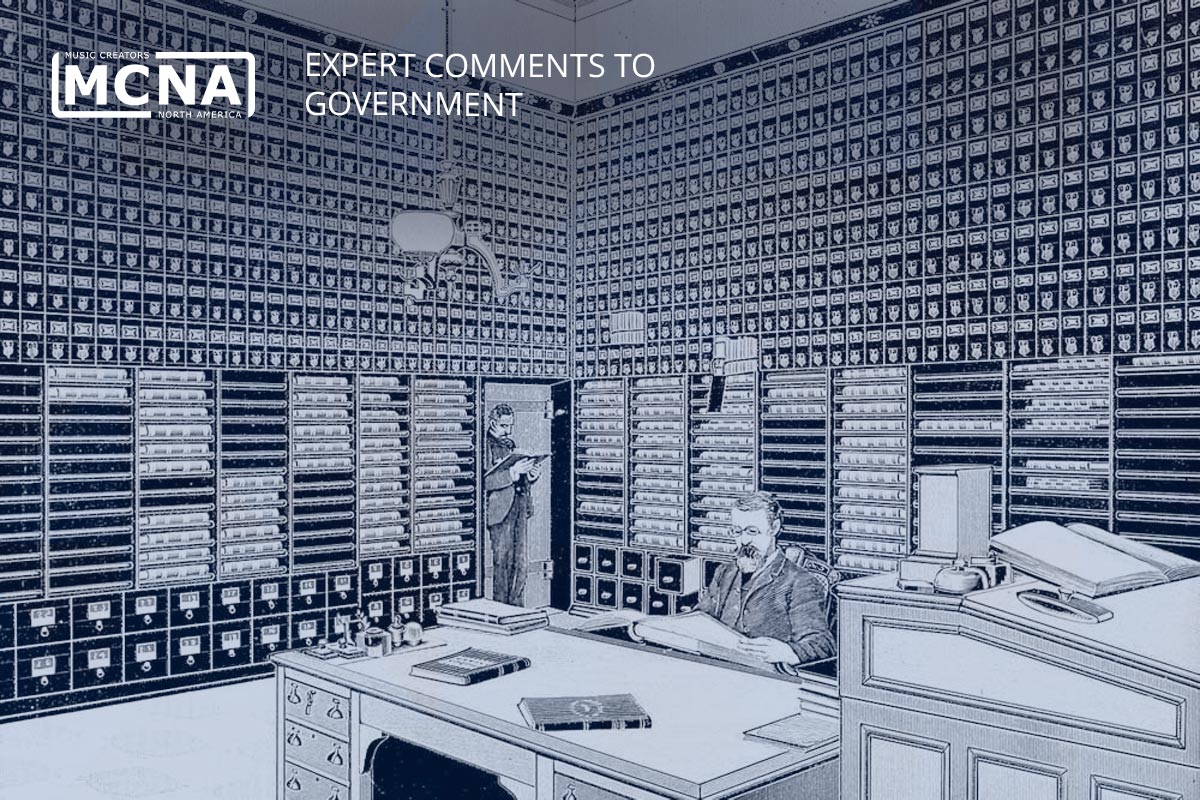Dear Principal Deputy Assistant Attorney General Hesse:
The following comments are submitted by Music Creators North America, Inc. on behalf of a global coalition of half a million songwriters and composers from the United States, Canada and our global sister organizations, in response to the request from your Division for reaction to its oral report to us regarding the ASCAP and BMI consent decrees.
We begin by stating once again that we strenuously object to the timetable set by the DOJ for the submission of these comments. Unlike the many multi-‐national, billion-‐dollar corporations identified by your Division as “interested parties” concerning this matter (including one of the world’s richest, most powerful and influential corporations, Google), our coalition of music creators does not have and cannot afford to maintain an army of antitrust attorneys and experts to immediately prepare a detailed analysis and refutation of the solely telephonic report we were given by DOJ.
We have asked several times for a reasonable extension of time to research and comment, made even more crucial by the fact that many of our individual members are on concert tours during the summer months and unable to be reached or canvassed. Your Division has offered as the explanation that because DOJ has received such intense criticism over its leaked comments in the press, it desires to get its official comments on the record as soon as possible. We do not consider that a valid reason for refusal.
Nevertheless, we were given just a few days to prepare a critique on conclusions that it took the DOJ two years to reach, and to which we have been given no written access. We have been forced therefore, to make our comments brief and to the point:
- We regard the announced intentions of the DOJ (a) not to amend the ASCAP and BMI consent decrees in ways that would allow us to receive fair market value for the performance of our works, and (b) to impose mandatory “full work licensing” on a copyright co-‐owner or co-‐ administrator if is so requested by a copyright user, as serious injustices that will further damage the ability of songwriters and composers to earn a living through our chosen profession. In the digital age, no group of creators has suffered more severe income devaluation (despite a substantial increase in the public consumption of our works) than songwriters and composers. The DOJ appears poised to add to these miseries.
- Moreover, damage to individual music creators is not the only problem that the DOJ will be exacerbating. Its contemplated conclusions are likely to cause serious damage to the future of American and global musical culture, and thus to future public access to and enjoyment of new music. By erecting hurdles that may substantially hinder collaboration among music creators in the future, and by adopting positions that drastically reduce the financial incentive to create in favor of driving royalty rates well below fair market value to serve the interests of corporations whose music distribution businesses have been built principally on our creative works, the DOJ is acting in ways that are inconsistent with principles of fairness and common sense. Its contemplated actions, in fact, fly directly in the face of the US Constitution’s celebrated recognition of the importance of motivating and protecting creators and inventors for the betterment of the community.
- We are also compelled to express deep concern that the DOJ did not give adequate consideration to international issues that impact on its pending recommendations (including World Trade Organization rules and protocols and US international treaty obligations), or to the recommendations of the US Copyright Office and other departments of the US Government more expert in intellectual property matters. The reasons underlying these seemingly willful omissions are unsettling to our community, and deserve further scrutiny.
As noted in our public statement (attached), the ONLY solace that may possibly be taken by music creators from the DOJ’s articulated intentions has been its decision not to approve so-‐called “partial withdrawal” by music publishers from ASCAP and BMI. Allow us to be clear that we do not regard this narrow point as negating in any way the damage inflicted on our community as described in the numbered points above. We simply acknowledge that the DOJ took the time to understand that granting such a privilege to music publishers would eviscerate the abilities of creators to defend themselves against an increasing lack of royalty transparency, resulting in serious additional losses to songwriters and composers.
We have addressed the insidious dangers of permitting partial withdrawal in our more formal past submissions, and see no reason to repeat those specific admonitions in these brief comments. We do take this opportunity to reiterate, however, that permitting partial withdrawal would make a grave situation for music creators infinitely worse, and we urge the DOJ not to change its position on this crucial issue at any time in the future, absent the imposition of extraordinary safeguards acceptable in advance to the music creator community.
In closing, we are disappointed, frustrated, and frankly bewildered by DOJ’s positions, and believe that they will further compound the indignities, unfairness, and financial losses that songwriters and composers have faced in recent years. We therefore ask that the DOJ fully and carefully reconsider its positions, including its position vis-‐a-‐vis whole work licensing, prior to publicly announcing them in final form.
Sincerely,
Rick Carnes
Co-Chair, Music Creators North America
Eddie Schwartz
Co-Chair, Music Creators North America
(Image: AnonymousUnknown author, Public domain, via Wikimedia Commons)

